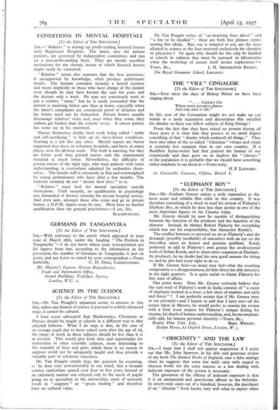SCIENCE IN THE SCHOOL
[To the Editor of THE SPECTATOR.]
S nt,—Dr. Van Praaght's argument seems to amount to this that, unless any branch of science is pursued to a fairly advanced stage, it cannot be cultural.
I have never advocated that Mathematics, Chemistry or Physics should be taught at schools in a different way to that adopted hitherto. What I do urge is that, in the case of an average pupil due to leave school soon after the age of 16, the range of study in these subjects should be less than it is at present. This would give both time and opportunity for instruction in other scientific subjects, more interesting to the majority of boys and girls, which there is no reason to suppose could not be adequately taught and thus provide a valuable part of scholastic education.
Dr. Van Praaght simply begs the. question by assuming, as he does very unwarrantably to my mind, that a broader science curriculum spread over four or five years instead of an extremely narrow one adapted only to the needs of pupils going on as specialists to the universities, must of necessity result in " snippets " or " spoon feeding " and therefore have no cultural value.
Dr. Van Praaght writes of "an inspiring feast ahead" and " a fire to be kindled " : these are both fine phrases repre- senting fine ideals. But, one is tempted to ask, are the seats allotted to science at the feast reserved exclusively for chemists or physicists ? Or again why should the fire only be kindled at schools in subjects that must be pursued in laboratories when the workshop of nature itself invites exploration ?-










































 Previous page
Previous page